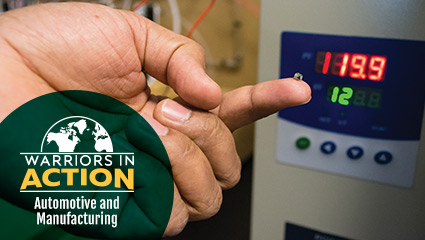Over the coming months, look for stories that feature some of the many Wayne State initiatives and pioneering individuals committed to automotive and manufacturing innovation. This content is part of WSU's Warriors in Action campaign highlighting how Wayne State is making a difference.
 Over the last several years, a Wayne State University College of Engineering research group has been at the forefront of developing new battery technologies that are more powerful, less expensive, sustainable and capable of operating in extreme conditions. The foci of the research team led by Leela Arava, assistant professor of mechanical engineering, are high-energy lithium-sulfur (Li/S) and high-temperature lithium-ion batteries.
Over the last several years, a Wayne State University College of Engineering research group has been at the forefront of developing new battery technologies that are more powerful, less expensive, sustainable and capable of operating in extreme conditions. The foci of the research team led by Leela Arava, assistant professor of mechanical engineering, are high-energy lithium-sulfur (Li/S) and high-temperature lithium-ion batteries.
The allure of Li/S batteries lies in the fact that they can theoretically store five times more energy than lithium-ion batteries. Despite the limitless potential Li/S batteries have evinced to be the next generation of batteries, there are several limitations that have hindered full-scale development. Arava’s research group has been working on a new configuration that addresses not only poor cycle-life issues but also enhances other areas that impede Li/S battery commercialization, such as low sulfur utilization and poor reaction kinetics.
Arava’s group has experimented with a novel electrocatalysis-based approach for Li/S batteries in order to stabilize and extend performance without compromising storage capacity, all while eliminating the use of traditional carbon layer in cell configuration.
“Our novel electrode configuration helps to overcome the major drawback of short cycle-life caused due to migration of dissolved polysulfides towards Li-anode in an Li/S system,” said Arava. “Such batteries could provide an opportunity to develop electric vehicles that match the power, range and cost of combustion engines.”
More recent work from Arava and his colleagues has focused on creating thermally stable lithium-ion batteries and supercapacitors capable of operating at high temperatures, which would have numerous applications in aerospace, defense, biomedical, and oil and gas exploration.
“As individual battery components and their interfaces are sensitive to temperature, the majority of high-temperature power solutions are dependent on primary batteries,” said Arava. “Our efforts to develop rechargeable batteries and supercapacitors have led to the development of a quasi-solid electrolyte that could sustain temperatures beyond 150 C.”
In marked contrast to conventional solid-state electrolytes that are limited to thin-film technology, quasi-solid electrolytes formulated using certain ceramics and ionic liquids offer a unique solution to all forms of battery technology.
Arava’s group is now moving toward transforming these nascent findings into a mature technology. Using emerging 3-D printing technology, Arava’s lab is working on the bulk production of high-temperature, rechargeable Li-ion batteries in various forms, including miniaturized batteries for microsensor applications.
Combined, these research endeavors represent a holistic approach aimed at realizing the next generation of lithium-based batteries.